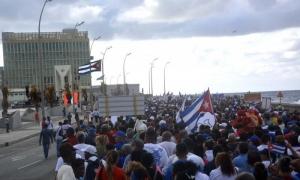
U.S. President Joe Biden on January 14 signed the presidential resolutions removing Cuba from the State Department's list of countries that allegedly sponsor terrorism, designating the suspension of the right to initiate actions under Title III of the 1996 Helms-Burton Act, and eliminating the list of restricted Cuban entities with which U.S. citizens and institutions are prohibited from engaging in financial transactions, which has had an effect on third countries.
The First Secretary of the Central Committee of the Communist Party of Cuba and President of the Republic, Miguel Díaz-Canel Bermúdez, on the social network X, thanked "all those who contributed to the decision announced by the U.S. to exclude Cuba from the list of state sponsors of terrorism, where it should never have been and which, together with two other measures adopted, has had a high cost for the country and Cuban families."
He added that "it is a decision in the right direction, although belatedly and with limited scope," as "the blockade and most of the extreme measures that were put in place since 2017 to suffocate the Cuban economy and cause shortages to our people remain in place.
"We will continue to confront and denounce the economic war and the actions of interference, disinformation and discrediting financed with U.S. federal funds. At the same time, we will not give up on developing a civilized and respectful relationship with the U.S.," he concluded.
The White House, for its part, states in the certification of the revocation of Cuba's designation as a state sponsor of terrorism, a status in effect since January 12, 2021, that the Government of Cuba has not provided any support for international terrorism during the preceding six-month period; and has provided assurances that it will not support acts of international terrorism in the future.
Regarding Title III of Helms-Burton, Biden issued a letter to the chairmen and the chairwomen of certain congressional committees regarding the six-months suspension of the right to sue under that law, effective January 29.
The list of restricted entities directs the repeal of National Security Presidential Memorandum 5, which dates from June 2017 and states that the United States is not backing away from its Cuba policy, but that "achieving these objectives will require practical engagement with Cuba and the Cuban people that goes beyond that outlined in NSPM-5, and that takes into account recent developments in Cuba and the changing regional and global context." This reveals their continuing intentions regarding the Island's political system and their will to keep the Revolution on its feet.
As a result, the Secretary of State will immediately rescind the list and the Secretary of the Treasury will initiate a process to adjust the current regulations.
The Cuban Ministry of Foreign Affairs, in a statement on the matter, emphasizes the limited nature of the measures, although they are in the right direction and in line with the sustained and firm demand of the Government and the people of Cuba, and with the broad, emphatic and reiterated call of numerous governments, especially in Latin America and the Caribbean, of Cubans living abroad, of political, religious and social organizations, and of numerous political figures in the United States and other countries. The Government of Cuba thanks everyone for their contribution and sensitivity.
With regard to the imminent arrival of Donald Trump in the White House on January 20, the Ministry of Foreign Affairs emphasizes the possibility that "the government of that country could in the future reverse the measures adopted, as has happened on other occasions, and as a sign of the lack of legitimacy, ethics, consistency and reason in its behavior toward Cuba".








